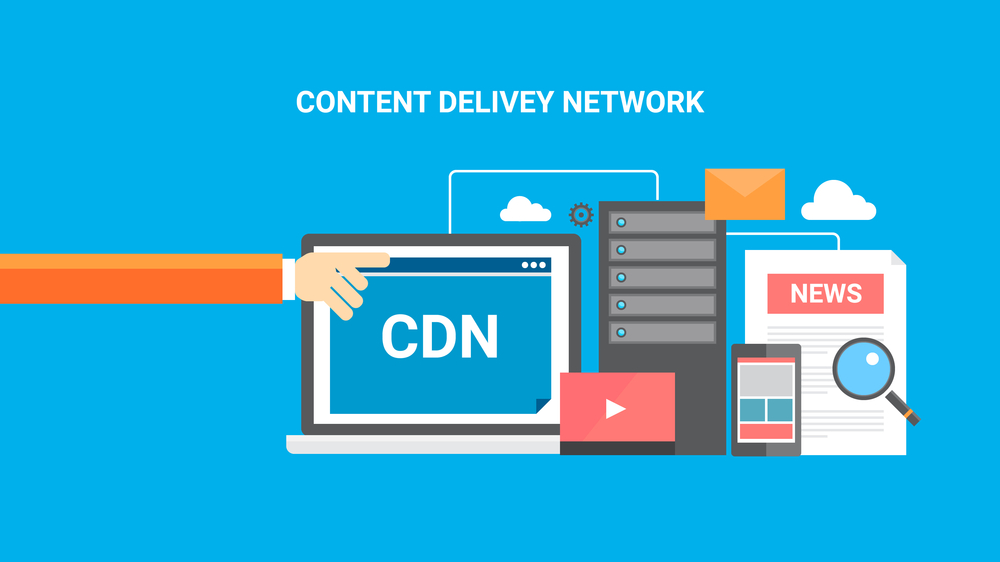When you access a website or application, have you ever noticed that loading times can vary depending on your geographical location? This is where a CDN (Content Delivery Network) plays a crucial role in enhancing the user experience. So, what is a CDN, and why does your business need it?
What is a CDN?
A CDN, or Content Delivery Network, is a network of distributed servers located across the globe. These servers store copies of your website or app’s data, including images, videos, JavaScript, and CSS files, and deliver them to users from the nearest server. This minimizes latency and speeds up page load times.
How does a CDN work?

Instead of accessing the origin server of a website every time a user requests a page, a CDN allows content to be distributed from the nearest CDN server. When you visit a website, the CDN system automatically selects the server closest to your location to deliver the data. This can significantly reduce download times, especially for websites with high traffic or users spread across different geographical areas.
Examples of popular CDNs:
- Cloudflare CDN: One of the largest CDN providers, Cloudflare not only offers content delivery services but also helps improve security.
- Amazon CloudFront: Amazon’s CDN service helps distribute content globally, especially for businesses using AWS infrastructure.
- Akamai: One of the oldest CDN providers, Akamai serves many large businesses with its vast network and highly customizable services.
Why do you need a CDN?
- Improved page load speed A CDN improves page load times by delivering content from servers closest to users. This is particularly useful for websites with users spread across different geographic regions. Faster load times not only enhance the user experience but also help with SEO optimization, as Google considers page speed a key factor in search rankings.
- Reduced load on the origin server By distributing traffic across CDN servers, you can reduce the load on your origin server. This helps avoid server overload during peak times, such as events or advertising campaigns.
- Enhanced security A CDN improves security by providing protection against DDoS attacks. CDN providers often integrate security solutions to help prevent attacks on your server. Additionally, CDNs offer SSL encryption features, ensuring user information is protected when accessing your website.
- Global scalability For businesses with global reach, a CDN is an essential solution. It allows you to easily serve content to users worldwide without having to build server infrastructure in each region. Instead, you can simply integrate CDN into your existing system, and it will automatically deliver content from the closest servers.
- Optimized mobile experience In an era where most users access the web via mobile devices, a CDN ensures that content like images and videos are compressed and quickly loaded on mobile devices, improving the overall user experience.
When should you use a CDN?

- When your website has international traffic: If you have users from different parts of the world, using a CDN will provide them with a better experience.
- When your website has a lot of static content: Websites that contain a lot of images, videos, CSS, and JavaScript files will benefit greatly from a CDN, allowing content to load faster and reducing the strain on the origin server.
- When you need enhanced security: Beyond speeding up page loads, a CDN also helps protect your website from network threats, especially DDoS attacks.
Some examples of effective CDN usage
- Netflix: Netflix uses a CDN to stream video content to millions of users worldwide. This not only reduces movie load times but also ensures stable video quality, even for users in regions with slower internet speeds.
- Facebook: To deliver multimedia content such as images and videos to billions of users, Facebook relies on a CDN to distribute content efficiently without overloading central servers.
- E-commerce: Online retail sites like Amazon and eBay also use CDNs to reduce page load times, ensuring a seamless shopping experience, especially during high-traffic periods like sales events.
Conclusion
A CDN is not just an advanced technological solution but also an essential factor in enhancing user experience, reducing system load, and improving security. With the continuous development of the internet and the growing demand for fast access, using a CDN brings numerous benefits to businesses, from improving page load times to protecting systems from cyberattacks.
If your business is looking to expand its reach and improve user experience, a CDN is certainly a solution worth considering.




